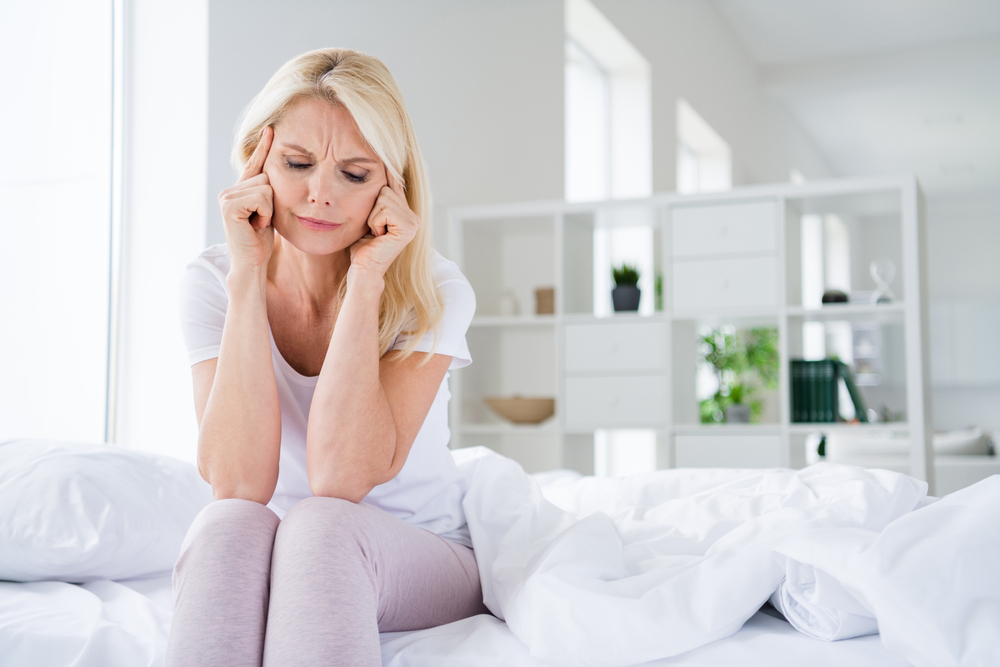
Introduction: Why Menopause Makes Sleep So Hard
If you’re going through menopause and finding yourself staring at the ceiling at 3 AM, you’re not alone. Nearly 60% of women experience sleep disruptions during this transition, whether it’s from night sweats, racing thoughts, or simply waking up exhausted despite a full night in bed.
Sleep disorders during menopause aren’t just about hormones—though they play a huge role. It’s also about how those hormonal shifts affect your body temperature, mood, and even breathing. The good news? You don’t have to accept sleeplessness as inevitable. With the right strategies, you can reclaim restful nights and wake up feeling refreshed.
In this guide, we’ll break down:
- The hormonal and physical reasons behind menopause-related sleep struggles
- How anxiety, mood swings, and brain fog make sleep even harder
- Practical, science-backed solutions to improve sleep naturally
- When to seek help—because sometimes, professional support is the best next step
Let’s dive in.
1. The Hormonal Rollercoaster: Why Menopause Disrupts Sleep
Estrogen and progesterone—two key hormones that regulate your cycle—also play a major role in sleep. As their levels drop during menopause, several things happen:
Estrogen Decline = Less Deep Sleep
- Estrogen helps regulate serotonin, a neurotransmitter that promotes relaxation and sleep.
- Lower estrogen means more fragmented sleep and trouble staying asleep.
- Research shows menopausal women experience less REM sleep, the phase crucial for memory and mood regulation.
Progesterone Drop = More Restlessness
- Progesterone has a natural calming effect, almost like a mild sedative.
- When levels fall, you may feel more alert at night or wake up frequently.
The Cortisol Connection
- Hormonal shifts can disrupt cortisol (stress hormone) rhythms, making it harder to wind down at night.
Bottom line: Your body isn’t working against you—it’s adjusting. Understanding these changes helps you tailor solutions that actually work.
2. The Physical Culprits: Night Sweats, Hot Flashes, and Sleep Apnea
Night Sweats & Hot Flashes
- Up to 75% of women experience these sudden heat surges, often at night.
- They disrupt deep sleep, leaving you exhausted even after 8 hours in bed.
- Solution:
- Keep your bedroom cool (around 65°F/18°C).
- Use moisture-wicking pajamas and breathable sheets.
- Avoid spicy foods, caffeine, and alcohol before bed—they trigger hot flashes.
Sleep Apnea Risk Increases
- Hormonal changes can relax throat muscles, leading to obstructive sleep apnea (pauses in breathing).
- Signs include loud snoring, waking up gasping, or feeling exhausted despite “sleeping” all night.
- Solution:
- Try side sleeping (reduces airway blockage).
- If symptoms persist, ask your doctor about a sleep study.
3. The Emotional Side: Anxiety, Mood Swings, and Brain Fog
Menopause isn’t just physical—it’s an emotional journey too. And those feelings can keep you up at night.
Anxiety & Racing Thoughts
- Hormonal shifts heighten stress responses, making it harder to relax.
- 51% of menopausal women report anxiety-related insomnia.
- Solution:
- Try a 10-minute bedtime meditation (proven to lower cortisol).
- Write down worries in a journal before bed to “clear your mind.”
Mood Swings & Irritability
- Fluctuating estrogen affects serotonin, leading to more emotional highs and lows.
- Solution:
- Gentle evening yoga (even 10 minutes) can stabilize mood.
- Magnesium-rich foods (like almonds or spinach) support relaxation.
Brain Fog & Fatigue
- Poor sleep worsens forgetfulness, creating a frustrating cycle.
- Solution:
- Prioritize short daytime naps (20 mins max) to recharge without disrupting nighttime sleep.
4. 6 Science-Backed Strategies for Better Sleep
1. Optimize Your Sleep Environment
- Keep it cool: Use a fan or cooling mattress pad.
- Block light: Blackout curtains or a sleep mask help.
- White noise: A sound machine can mask disruptive noises.
2. Adjust Your Evening Routine
- Limit screens 1 hour before bed (blue light disrupts melatonin).
- Sip herbal tea (chamomile or valerian root promote relaxation).
3. Move Your Body—But Not Too Late
- Morning walks regulate your circadian rhythm.
- Avoid intense workouts within 3 hours of bedtime (they raise cortisol).
4. Eat for Better Sleep
- Avoid heavy meals late at night (digestion disrupts sleep).
- Try a small protein snack (like Greek yogurt) to stabilize blood sugar.
5. Mindfulness & Stress Relief
- Progressive muscle relaxation (tense/release each muscle group).
- Deep breathing (4-7-8 method) calms the nervous system.
6. Track Your Symptoms
- Use Shero’s symptom tracker to spot patterns (e.g., caffeine = worse night sweats).
5. When to Seek Professional Help
While lifestyle changes help many women, sometimes extra support is needed. Consider talking to a doctor if:
- You’ve had insomnia for over 3 weeks.
- You snore loudly or gasp for air at night (possible sleep apnea).
- Anxiety or mood swings feel unmanageable.
Treatment options may include:
- Cognitive Behavioral Therapy (CBT) for insomnia (highly effective for long-term sleep improvement).
- Hormone therapy (HRT)—if symptoms are severe (always discuss risks/benefits with your doctor).
Conclusion: You Deserve Restful Sleep
Menopause-related sleep struggles are real—but they’re not forever. By understanding the hormonal, physical, and emotional factors at play, you can take steps toward better rest.
Start small:
- Pick one or two of the strategies above (like cooling your room or adding magnesium-rich foods).
- Track your progress in Shero’s symptom log to see what works best for you.
Remember, sleep isn’t a luxury—it’s a necessity. And with the right tools, you can wake up feeling like yourself again.
💜 Shero is here for you—every step of the way.
Want more personalized tips? Try Shero’s Daily Wellness Reminders for gentle nudges on hydration, stress relief, and sleep support—tailored just for you.
(All features are free, because every woman deserves support without barriers.)